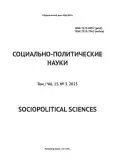From the Invisibility of the Familiar to the Construction of Religious Names in Russian and Chinese Cultures (the Perspective of Intercultural Communication)
- Autores: Arinin E.I.1, Kun L.1
-
Afiliações:
- Alexander and Nikolay Stoletov Vladimir State University
- Edição: Volume 15, Nº 3 (2025)
- Páginas: 213-220
- Seção: Social and Political Philosophy
- URL: https://journals.eco-vector.com/2223-0092/article/view/687919
- DOI: https://doi.org/10.33693/2223-0092-2025-15-3-213-220
- EDN: https://elibrary.ru/TYORIA
- ID: 687919
Citar
Texto integral
Resumo
The article examines a number of examples of how key terms were created in Russian and Chinese cultures, which were used to construct an understanding of religious phenomena, including religion, magic, atheism, superstition, etc. The analysis is conducted from the standpoint of modern religious studies (anthropological theories of J. Fraser, B. Malinovsky, etc.) and social philosophy (N. Luhmann’s concept of autopoietic systems). Religion is described as “overseeing the unknown”, which, on the one hand, always remains “invisible”, i.e. It is “invisible”, but, on the other hand, in all cultures it is also symbolically constructed in images and symbols of the “sacred” (individual and collective practices and representations), as proper and worthy forms of local worship of “the highest order of nature, which is called divine” (Cicero). Three levels of representation of religious phenomena by means of intercultural communication as languages of the first, second and third order (I1, I2 and I3) are considered.
Palavras-chave
Texto integral
Sobre autores
Evgeny Arinin
Alexander and Nikolay Stoletov Vladimir State University
Autor responsável pela correspondência
Email: eiarinin@mail.ru
Código SPIN: 5251-4026
Scopus Author ID: 37060239800
Dr. Sci. (Philos.), Professor; Head of the Department of Philosophy and Religious Studies
Rússia, VladimirLiu Kun
Alexander and Nikolay Stoletov Vladimir State University
Email: guoliukun@gmail.com
ORCID ID: 0009-0007-4094-8022
Código SPIN: 9687-2500
Postgraduate Student at the Department of Philosophy and Religious Studies; Senior Lecturer at the Department of English Language of the Faculty of Pedagogy
Rússia, VladimirBibliografia
- Arinin E.I., Glagolev V.S. Religious aspects of atheism and piety phenomena in the culture of the Cicero era (based on the material of 7 Russian translations of “On the Nature of the Gods”, 1752–1998). Religious Studies. 2020. No. 2. Pp. 77–90. (In Rus.)
- Arinin E.I., Lyutaeva M.S., Liu K. China, Russia and intercultural communication: a religious studies analysis of the formation of distinctions of the religious name «God/God». In: Church, state and society in the history of Russia and Orthodox countries: religion, science and education. Proceedings of the International Scientific Conference (Vladimdir State University named after Alexander and Nikolay Stoletovs; Vladimir the Archdiocese of Russian Ortodox Churches, May 21, 2024). Vladimir: Publishing House of the Vladimdir State University, 2024. Pp. 10–13.
- Arinin E.I., Markova N.M., Takahashi S. The term “religion” in the context of a “glocal” approach to intercultural communication in Russia and Japan. Concept: Philosophy, Religion, Culture. 2019. No. 4 (12). Pp. 164–177. (In Rus.)
- Zabiyako A.P., Khaimurzina M.A. Interpretation of religion by Chinese thinkers in the context of the development of religious studies in China (the second half of the XX – beginning of the XXI century). The first article. Religious Studies. 2013. No. 2. Pp. 64–74. (In Rus.)
- Zabiyako A.P., Khaimurzina M.A. Interpretation of religion by Chinese thinkers in the context of the development of religious studies in China (the second half of the XX – beginning of the XXI century). The second article. Religious Studies. 2013. No. 3. Pp. 70–88. (In Rus.)
- Kostylev P.N. Institutionalization of religious studies at Moscow State University in the first half of the twentieth century. Bulletin of the Orthodox St. Tikhon’s University for the Humanities. Series 1: Theology. Philosophy. Religious Studies. 2013. No. 5. Pp. 79–95. (In Rus.)
- Luhmann N. Differentiation. Transl. from German. Moscow: Logos, 2006. 320 p.
- Maslov A.A. China: Taming of dragons. Spiritual quest and sacred ecstasy. Moscow: Alethea, 2006. 480 p.
- Tretyakova E.Yu., Spachil O.V. Russian-language translations and transcriptions of “Ballads of East and West” by R. Kipling. In: Britons and peoples of Southern Russia: Problems of mutual influence. Collection of scientific articles. Krasnodar: Ekoinvest, 2015. Pp. 219–227.
- Filonov S.V., Li Xin. Formation and current state of Chinese religious studies (assessed from the outside and from the inside). Religious Studies. 2018. No. 1. Pp. 126–143. (In Rus.)
- Zhang Xi. The development of religious studies in Russia and China in the late XX – early XXI centuries: A comparative analysis. Abstract of dis. ... of Cand. Sci. (Philos.). St. Petersburg: St. Petersburg State University, 2017. 20 p.
- Chen Yuqiong. About the history of Chinese-Russian dictionaries in Russia and China. Bulletin of Perm University. Russian and Foreign Philology. 2023. Vol. 15. Issue 1. Pp. 67–77. (In Rus.)
- Shakhnovich M.M. The concept of “Scientific atheism”: The history of its construction and introduction to philosophy and political practice (1954–1964). Bulletin of St. Petersburg University. Philosophy and Conflictology. 2022. Vol. 38. Issue 3. Pp. 436–448. (In Rus.)
- Shokhin V.K. Philosophy of religion and its historical forms (antiquity – the end of the XVIII century). Moscow: Alpha-M, IF RAS, 2010. 784 p.
Arquivos suplementares











